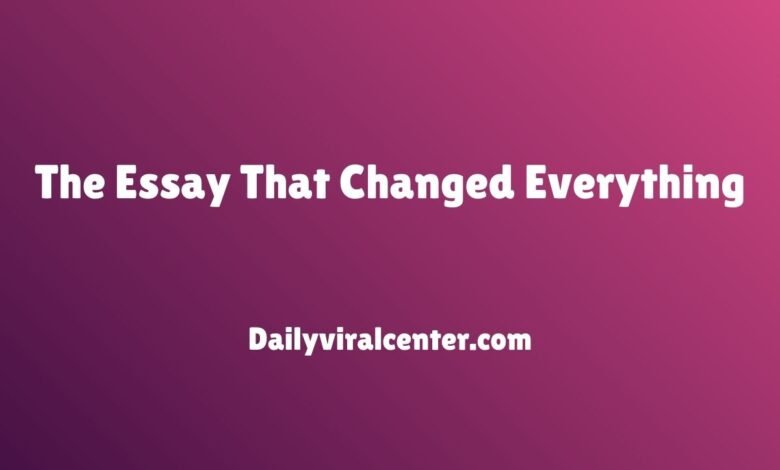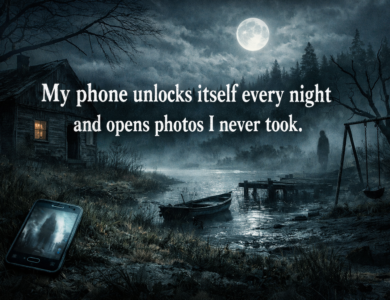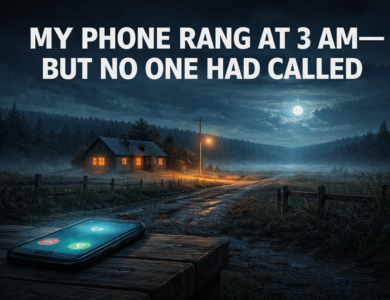
Once, I was reviewing my students’ essays and everything was normal until I saw Sam’s work. There was something strange in the last paragraph of his essay and I got very scared. He wrote, “Sometimes, I think it would be easier if I just disappeared, and maybe no one would even notice for days.”
That sentence stopped me cold. I re-read it three times. My heart started racing. Sam wasn’t the kind of student who drew attention to himself. Quiet kid. Polite. Always handed his work in on time, but never said much in class. The essay topic was “The Person Who Changed My Life,” and most students wrote about a parent or a coach. Sam wrote about his older brother. It was touching, but that final line felt like a cry for help.
I sat there in the staff room, coffee forgotten, staring at his paper. I thought, Should I tell someone? I wasn’t a counselor. I taught English, not psychology. But ignoring it didn’t sit right with me.
The next morning, I pulled Sam aside after class. I kept my tone light. “Hey, just wanted to say your essay was really moving. Especially what you wrote about your brother.”
He looked down at his shoes, shrugged. “Yeah, he was pretty cool.”
Was. Past tense.
“Do you want to talk about the last paragraph a bit? The part about disappearing?” I asked gently.
He shrugged again. “It’s just a writing thing. You said to be honest.”
I nodded, trying not to push too hard. “I did. And I appreciate that. But just so you know, if anything’s going on—anything at all—you don’t have to handle it by yourself.”
That was it. He gave me a small nod and walked off.
I flagged it to the school counselor anyway. I wasn’t sure if it was the right move, but it felt better than doing nothing. I didn’t hear anything back right away, but about a week later, she stopped by my classroom after lunch.
“You were right,” she said softly. “There’s a lot going on at home. Thank you for saying something.”
Apparently, Sam’s older brother, Amir, had died in a car accident last year. The family hadn’t really talked about it since the funeral. His parents were both working long hours, trying to stay afloat. Sam had been holding it in, pretending everything was okay.
I kept checking in with him, casually, over the weeks that followed. A quick “How’s your day?” or “What book are you reading lately?” He never said much, but I could tell he noticed. I started noticing small changes. He stayed a few minutes after class. He turned in a poem one day, raw and heartbreaking, but beautiful. Something was shifting.
About a month later, during a parent-teacher night, his mom came to see me. She looked tired but grateful.
“Sam talks about your class a lot,” she said. “He says he feels… safe there.”
I wanted to hug her, but I just smiled and said, “He’s a good kid.”
That might’ve been the end of it. But it wasn’t.
Because two months later, I got another essay. From a different student.
This time it was from Nia, a sharp, bubbly girl who always sat in the front row and asked a thousand questions. The assignment was about “A Turning Point In My Life.” Most students wrote about moving schools or their parents’ divorce. Nia wrote about a friend who stopped her from doing something “she could never undo.”
She didn’t name the friend, or the action. But the whole essay was heavy. The kind of heavy that doesn’t belong in a 10th grader’s paper.
I read it three times, just like I had with Sam’s.
And then I started wondering.
Were they all going through this?
Was I missing more?
I added a prompt for the next journal entry: “Write about a time someone helped you, even if they didn’t know it.”
The answers that came in broke me a little.
One student wrote about how the lunch lady slipped her extra food because she didn’t get dinner most nights.
Another talked about her grandma—now passed—who was the only person who remembered her birthday.
And one kid wrote, “I sit in the library during lunch so I don’t have to pretend I have friends.”
I cried in my car after school that day.
Not out of pity—but out of shame. For how many signals I might’ve missed over the years. How many kids came into my classroom carrying entire invisible worlds on their backs.
So I started doing something different.
Nothing huge. But I left notes.
Sticky notes on desks. “You’ve got a sharp eye for detail.” “Loved your use of metaphor.” “I noticed how you helped your classmate. That was kind.”
I made it a point to ask real questions: “How are you?” Not “How’s your homework.” I gave space for honesty.
Some students rolled their eyes. But others softened. They started writing more, telling me about their weekends, their dreams, their worries.
One even asked if I could read his short stories outside of class. I said yes.
That year changed how I teach forever.
But that’s not the twist.
The twist came two years later, in a Starbucks.
I was waiting in line, half-distracted, when a tall young man tapped my shoulder.
“Ms. Laga?”
I turned. It was Sam. Taller, older, with a calmness I hadn’t seen before.
He smiled. “I just wanted to say thank you.”
I blinked. “For what?”
“For not brushing it off. That day. The essay.”
I opened my mouth to reply, but he kept going.
“After I saw the counselor, things didn’t magically get better. But it started something. My mom and I went to grief therapy. I started doing photography, which helped. I made a couple friends who… got it. It took a while, but I’m okay now.”
I nodded, suddenly emotional. “You always had a quiet strength, Sam.”
He laughed. “You wrote that on a post-it once. I kept it. Still have it taped to my mirror.”
We talked a little more. He was in community college now, studying visual arts. Said he wanted to maybe work with kids one day.
Before he left, he said something I’ll never forget.
“You probably don’t realize this, but you changed a lot of us. Just by noticing.”
That night, I sat in my apartment with a glass of tea and thought about all the essays, the scribbled poems, the subtle signals. How easy it was to overlook them when I was buried in grades and lesson plans.
And how easy it was to not overlook them, if I just slowed down.
One kind word. One small question.
Sometimes that’s enough to change a path.
I kept teaching, of course. More students came through, more essays written, more stories shared.
Some stories were heavy. Some funny. Some confusing. But I never read another assignment the same way again.
Because I realized—every single one was a window.
A chance to see deeper.
And maybe, just maybe, hand someone a lifeline they didn’t know they needed.
So if you’re a teacher, or a parent, or honestly just a person moving through the world—look closer. Not everything that matters is loud.
The quiet kids are telling us everything, if we know how to listen.
Thanks for reading. If this story moved you, hit that like button and share it with someone who needs a reminder: a little kindness goes a long way.







